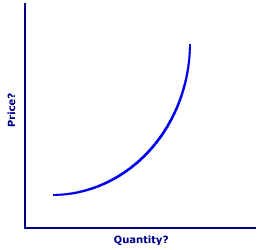
|
|
SECURITIES AND EXCHANGE COMMISSION: (SEC) A federal government agency that regulates the trading of corporate stock to protect investors against unscrupulous practices. Like a number of other federal regulatory agencies, the SEC was established in the 1930s--1934 to be exact. The impetus for its formation was to prevent investors from manipulating the stock market and to prevent other practices that contributed to the 1929 stock market crash. The SEC has all sorts of rules governing the stock market, including information disclosure, insider trading, speculation, and use of credit.
Visit the GLOSS*arama
|
|


|

|
                           SHORT-RUN AGGREGATE SUPPLY AND MARKET SUPPLY: The short-run aggregate supply curve, or SRAS curve, has similarities to, but differences from, the standard market supply curve. Both are positively sloped. Both relate price and quantity. However, the market supply curve is positively sloped due to the law of diminishing marginal returns and the short-run aggregate supply curve is positively-sloped due to inflexible prices, the pool of natural unemployment, and imbalances in real resource prices. | Two Similar Curves |  |
To illustrate the specific short-run aggregate supply and market supply curve similarities and differences consider the graph of a positively sloped curve displayed here. Is this a market supply curve or an short-run aggregate supply curve? A cursory analysis suggests that it could be either.To reveal the similarities between the both curves, click the [Market Supply] and [Aggregate Supply] buttons. Doing so illustrates that both curves are positively sloped, with each virtually overlaying the other. Consider the differences between these two curves. - First, note that for the market supply curve, the vertical axis measures supply price and the horizontal axis measures quantity supplied. For the short-run aggregate supply curve, however, the vertical axis measures the price level (GDP price deflator) and the horizontal axis measures real production (real GDP).
- Second, the positive slope of the market curve reflects the law of supply and is attributable to the law of diminishing marginal returns. In contrast, the positive slope of the short-run aggregate supply curve is attributable to: (1) inflexible resource prices that often makes it easier to reduce aggregate real production and resource employment when the price level falls, (2) the pool of natural unemployment, consisting of frictional and structural unemployment, that can be used temporarily to increase aggregate real production when the price level rises, and (3) imbalances in the purchasing power of resource prices that can temporarily entice resource owners to produce more or less aggregate real production than they would at full employment. Similar, but different.
Most notable, the differences between market supply and short-run aggregate supply means that it is not possible to merely add up, or aggregate, the market supply curves for the thousands of goods produced in the economy to derive the short-run aggregate supply curve. The short-run aggregate supply curve dances to its own music and plays be its own set of rules.

Recommended Citation:SHORT-RUN AGGREGATE SUPPLY AND MARKET SUPPLY, AmosWEB Encyclonomic WEB*pedia, http://www.AmosWEB.com, AmosWEB LLC, 2000-2025. [Accessed: July 18, 2025].
Check Out These Related Terms... | | | | | |
Or For A Little Background... | | | | | | | | | | |
And For Further Study... | | | | | | | | | | |
Search Again?
Back to the WEB*pedia
|



|

|
BLUE PLACIDOLA
[What's This?]
Today, you are likely to spend a great deal of time searching the newspaper want ads looking to buy either a wall poster commemorating the first day of winter or blue cotton balls. Be on the lookout for rusty deck screws.
Your Complete Scope
This isn't me! What am I?
|

|
|
The standard "debt" notation I.O.U. does not mean "I owe you," but actually stands for "I owe unto..."
|

|
|
"A winner is someone who recognizes his God-given talents, works his tail off to develop them into skills, and uses those skills to accomplish his goals. " -- Larry Bird, basketball player
|

|
MBA
Master of Business Administration
|

|
|
Tell us what you think about AmosWEB. Like what you see? Have suggestions for improvements? Let us know. Click the User Feedback link.
User Feedback
|


|


